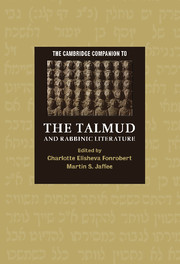Book contents
- Frontmatter
- Introduction: The Talmud, Rabbinic Literature, and Jewish Culture
- Part I: The Conditions of Rabbinic Literary Activity
- Part II: The Genres of Rabbinic Literary Composition
- 5 Rabbinic Midrash and Ancient Jewish Biblical Interpretation
- 6 The Judaean Legal Tradition and the Halakhah of the Mishnah
- 7 Roman Law and Rabbinic Legal Composition
- 8 Middle Persian Culture and Babylonian Sages: Accommodation and Resistance in the Shaping of Rabbinic Legal Tradition
- 9 Jewish Visionary Tradition in Rabbinic Literature
- 10 An Almost Invisible Presence: Multilingual Puns in Rabbinic Literature
- Part III: Hermeneutical Frames for Interpreting Rabbinic Literature
- Bibliography
- Index
- Source Index
- Series List
6 - The Judaean Legal Tradition and the Halakhah of the Mishnah
from Part II: - The Genres of Rabbinic Literary Composition
Published online by Cambridge University Press: 28 November 2007
- Frontmatter
- Introduction: The Talmud, Rabbinic Literature, and Jewish Culture
- Part I: The Conditions of Rabbinic Literary Activity
- Part II: The Genres of Rabbinic Literary Composition
- 5 Rabbinic Midrash and Ancient Jewish Biblical Interpretation
- 6 The Judaean Legal Tradition and the Halakhah of the Mishnah
- 7 Roman Law and Rabbinic Legal Composition
- 8 Middle Persian Culture and Babylonian Sages: Accommodation and Resistance in the Shaping of Rabbinic Legal Tradition
- 9 Jewish Visionary Tradition in Rabbinic Literature
- 10 An Almost Invisible Presence: Multilingual Puns in Rabbinic Literature
- Part III: Hermeneutical Frames for Interpreting Rabbinic Literature
- Bibliography
- Index
- Source Index
- Series List
Summary
The subject of this essay is the prehistory of mishnaic law. Sixty-two of the sixty-three tractates of the Mishnah treat questions of halakhah, that is, law, practice, and ritual. When the Mishnah talks about blessings and tithes, Sabbath and festivals, marriage and divorce, torts (physical and financial damages) and contracts, slaughter and sacrifice, or purity and impurity, it devotes almost exclusive attention to the exposition of law, at great length and in great detail. Whence come all these laws and all these details?
The Mishnah itself is not interested in this question. The opening paragraphs of Mishnah Avot, the lone mishnaic tractate not devoted to legal matters, presents the theory of a rabbinic chain of tradition, stretching via master and disciple from Moses on Mt. Sinai to the mishnaic sages themselves:
Moses received Torah at Sinai and transmitted it to Joshua; Joshua to the elders; the elders to the prophets; the prophets transmitted it to the Men of the Great Assembly. . . . Simeon the Righteous was one of the last of the Men of the Great Assembly. . . . Antigonus of Sokho received [Torah] from Simon the Righteous . . . [four more links in the chain are given] . . . Hillel and Shammai received [Torah] from them. . . . Rabban Yohanan ben Zakkai received [Torah] from Hillel and Shammai. . . . Rabban Yohanan ben Zakkai had five disciples: R. Eliezer b. Hyrcanus, R. Joshua b. Hannaniah [and three others]
- Type
- Chapter
- Information
- The Cambridge Companion to the Talmud and Rabbinic Literature , pp. 121 - 143Publisher: Cambridge University PressPrint publication year: 2007
- 11
- Cited by

